The standard waste equipment doesn’t work for every job. Our experts will evaluate your needs and help determine if one of our specialty pieces of equipment could help your company save you time and money.
Types of Waste Specialty Equipment
We offer a variety of different types of waste specialty equipment to meet your needs. Our Brask experts can work with you to evaluate which equipment will best meet your needs!
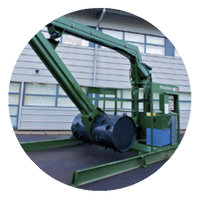
Rotokrush
The Rotokrush compaction system is a unique product which provides the customer with the flexibility to load up to 50 cubic yard containers with bulky materials such as packing cases, pallets, wood, glass fibre and other industrial/difficult medium density waste materials whilst achieving compaction ratios on average of 4:1.
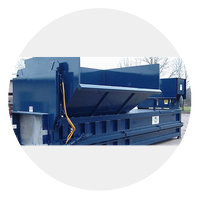
Pre-crusher
The Precrusher offers a 5” steel wall to crush trash against, and with a resultant ram force, waste material is reduced to a fraction of the original volume. Rubbish is completely crushed before being pushed into the container, making it a good solution for product destruction. Some common applications include: Thrift stores, manufacturing facilities, applications where complete product destruction is desired for brand protection.
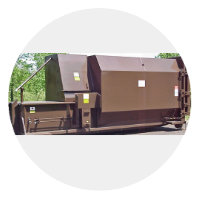
Dumpers
Hydraulic cart dumpers (tippers) help save time, reduce back injuries, cut costs and solve material handling problems. Our hydraulic cart dumpers can be typically customized to accommodate your current carts even if you have 2 or 3 different cart styles. We have several styles of hydraulic cart dumper and decades of experience solving unique challenges presented to us by our clients.
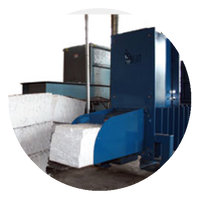
Styrofoam Densifier
Polystyrene Styrofoam Foam Densifiers can generate revenue for many businesses that generate large volumes of Styrofoam & EPS foam scrap (retail stores, malls, supermarkets, manufactory etc.). They can densify & produce EPS foam truckload weights up to 40,000 lbs, reduce storage requirements volume reductions of up to 50:1 and reduce hauling & handling costs.
Construction Compactor
Construction Compactors serve not only as a dumpster but are perfect for businesses removing a large amount of standard solid waste. They mean fewer number of pickups and greater storage space. These containers also work great for apartment complexes, shopping centers, hotels, and industrial facilities. tight, condensed loads ensures your waste remains secure until collection.
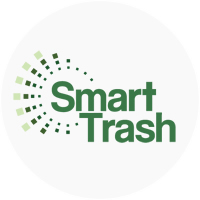
Monitor
SmartTrash® Management Service lowers your waste and recycling costs by reducing the number of times your compactor(s) are emptied. Most organizations purchase their waste and recycling service is on a regular schedule but with ATM’s SmartTrash® System your pickups will only occur when it results in lower costs, lower problems and a smaller environmental impact.
Frequently Asked Questions
What is EPS?
EPS stands for “expanded polystyrene.” Polystyrene is a light-weight material with good insulating properties that is used in numerous products, such as protective packaging material for valuables during shipping, custom insulation in building applications, safety equipment, bicycle helmets, insulating cups that keep beverages hot or cold, and many other uses. EPS is about 98% air; the remaining 2% polystyrene is hydrocarbon. EPS is an inert petroleum-based plastic material. The trademarked name Styrofoam is often incorrectly used as a generic term for expanded polystyrene foam (not extruded polystyrene).
What makes EPS Foam Densifiers & Polystyrene Densification Systems such effective recycling equipment?
EPS Densifiers can achieve volume reduction benefits of up to 50 to 1 for maximum densification of scrap EPS packaging. This basically means that scrap weighing about 15 lbs per cubic yard can be densified into logs that equal roughly 500 – 800 pounds per cubic yard. The high densification capabilities of quality EPS equipment make this a wise investment, as increased EPS waste tonnage can translate into substantial revenue.
How much compacted EPS foam generally fills a trailer?
While a full trailer load of loosely stacked EPS foam usually weighs approximately 2,000 pounds, a full trailer load of compacted EPS foam that has been processed through a densifier weighs up to 40,000 pounds – much more cost effective for shipping!
How much EPS is recycled annually?
- Over 71 million pounds of EPS were recycled in 2010. This is a slight increase from the 69 million pounds of EPS that were recycled in 2008. In the past decade, the average recycling rate of EPS is 12% – one of the highest recycling rate of the plastics family.
What products are made from recycled EPS?
- There are many useful products made from recycled EPS, including packing material (shape molded, block molded, packing peanuts), insulation products for construction applications, park benches, door and window frames, crown moulding, picture frames, safety helmets, flower pots, seedling containers, and much more. Recycled EPS can also be mixed with concrete to produce prefabricated concrete blocks and other new building products, or mixed with plastics products to produce decking, interior trims, and other useful items.
